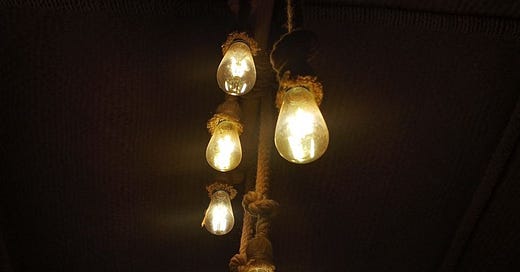I didn’t forget to send yesterday’s letter. It has been on my mind all week. But truthfully, I haven’t felt this overwhelmed in a long time.
By Tuesday morning, it felt like we had lived through an entire week, even though it was only the second day.
So much was happening all at once, and still is.
I work in a conflict and humanitarian newsroom as a sub-editor, and I recently took on an additional role as Head of Standards and Ethics—think of it as the quality assurance person in a factory. It’s barely been a year since I joined the team, and I don’t think I’ve experienced the kind of emotional and professional rush I did last week.
It’s the start of the farming season in Nigeria, and sadly, renewed attacks on agrarian communities in Benue and Plateau states have followed. I feel deeply connected to both places—Benue is where I was born and raised, and Plateau is where I spent my university years.
I’ve had to edit and even write several reports about killings in these places and across the country. I’m trying to be conservative with the figures, but over 100 people were killed in Nigeria last week—many in deeply cruel ways.
These aren’t just numbers.
These are lives: human beings with families, dreams, and histories. And yet, we’re becoming dangerously desensitised. It’s not meant to be this way.
Part of my work last week involved spending time with survivors. One elderly woman I spoke with lost four of her children in an attack. Her daughter-in-law and grandchild sustained serious injuries and are still receiving treatment. I pray they survive. Some escaped with their lives, but lost everything else.
Listening to these stories directly from the people affected is heartbreaking. Mama broke down in tears several times during our conversation.
It all left me feeling incredibly overwhelmed. But then came the Easter Vigil.
As is customary, all the lights in the church were turned off. At the entrance, wood was set alight, and from that fire, the Paschal candle was lit. As we processed into the church, the flame from that one large candle began to spread, gently illuminating the small candles we each held. Slowly but surely, the light overcame the darkness.
It struck me, in that moment, how much the world, especially Nigeria, and other war-torn nations, is drowning in darkness. We go to bed unsure if we’ll wake up, or be killed in our sleep. No one feels safe. A top official’s convoy was recently attacked. A state governor had to travel in an armoured tank. Yes, it’s that bad. And then there’s us—ordinary citizens, left defenceless.
But the spread of that light reminded me of something essential: hope.
The hope that even in the thickest darkness, light still finds a way. That hope does not need to be loud or dramatic, it can begin as a single flicker, shared from one person to another, until it lights up a whole room. That in our despair, we are not alone, and we are not powerless.
Hope is not a denial of the suffering or chaos around us. It is a decision, a defiant, determined choice, to believe that healing is possible, that justice can prevail, and that life, even when broken, can be rebuilt. Hope reminds us that we have survived before, and we can survive again.
It teaches us to look for light not only in the grand gestures, but in the quiet, consistent acts of care, like a neighbour sharing food, a friend checking in, a stranger offering comfort, or a journalist telling the truth.
Whether it’s the general state of the world, or a personal sense of despair, there will be light. We are the light, and together, we will extinguish the darkness that surrounds us.
So hold on. And when you can, be someone else's candle.
🍿 Things that I have enjoyed recently:
I’m currently reading Motion: A Jenta Story by Lengdung Tungchamma, a moving memoir about his journey from a tough neighbourhood in Jenta, central Nigeria, to becoming a voice for change. It captures the realities of growing up in a close-knit yet challenging community, the vices that lurked around every corner, and the turning point: his departure to a school far away that reshaped his life.
What stands out most is how Lengdung and his friends returned to change the narrative of their community. Through the Jenta Reads initiative, he’s helping to transform public perception and is leading a much-needed movement for a reading culture in Nigeria. His story is not only inspiring, but also a gentle reminder that change often starts with one person taking a bold step forward.
I recently watched G20 on Netflix and thoroughly enjoyed it. It’s the kind of film that keeps you engaged, and, without giving too much away, it’s a refreshing mix of action, tension, and unexpected grit.
I also watched Silver Ever After, a heartfelt movie that follows a middle-aged couple on the brink of their 25th wedding anniversary. As they become empty nesters, they’re forced to confront the silence, the distance, and the unspoken questions that have gathered over the years. It’s a quiet, emotional story about love, vulnerability, and the courage it takes to choose each other all over again.





Thank you for writing, Johnstone. May this hope never wane.
Sending you all my love from this part of the country,Happy Easter.
We HOPE that LOVE will HEAL the world somehow in the end.